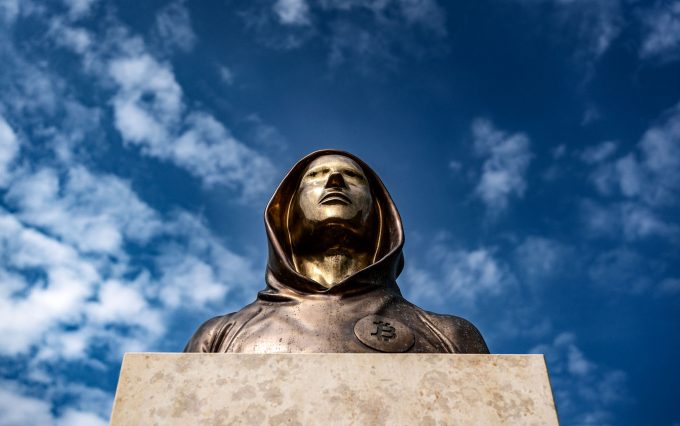
20th April 2023
Non-Fiction
14 minutes read
Crypto: The Teenage Years

20th April 2023
14 minutes read
Budapest boasts the first statue of Satoshi Nakamoto, the pseudonymous creator of Bitcoin. In fact, it’s more a bust (is there some international body to adjudicate in these matters?). The hooded face is deliberately indistinct, but it is highly reflective, the gimmick being that close up you can see yourself. Because, we are all Satoshi.
My favorite statue in Budapest is that of Anonymous, a nameless medieval notary who wrote the early history of Hungary. The hooded figure does have a face, but from a distance and most angles, all you see is a black space. Anonymous looks very much like a hacker in a hoodie (around and around we go).
I’d suggest the organizers of Satoshi’s bust would have been better off with the black hole, but perhaps they wanted to avoid the charge of plagiarism. In any case, Anonymous misplaced his identity, while Satoshi’s identity was intended to be a mystery. In addition, there’s something incongruous about Satoshi, a digital insurgent, a C++ freedom fighter, forming a lump on a pedestal like the Emperor Augustus or Beethoven.
Satoshi’s ambition with Bitcoin, a peer-to-peer electronic cash, was to undermine the global financial system,
so not giving out your home address was understandable. Such a seditious, guerilla act could invite a mighty backlash. Satoshi made himself scarce soon after Bitcoin’s birth. Now in its thirteenth year, Bitcoin’s orphan success is absurd. It’s absurdity to the power of a hundred. It shouldn’t have survived. It shouldn’t have flourished. But it has. It did. There were several attempts before Bitcoin to create digital dosh, Nick Szabo’s bit gold for example, but none took off.
Bitcoin has been vilified and written off by governments, by banks central and highstreet, by the media, by bloggers, by pastors, by loudmouths in pubs. As a bubble. As tulips. As a fad. As a pure Ponzi. As the drug dealer’s delight. As an insolent guzzler of energy. As a rampant infestation of skullduggery. That last accusation certainly has some weight, but as the faithful would point out, there’s no more crime and chicanery in crypto than you’ll find on Wall Street.
There is a website that lists the Bitcoin obituaries that have appeared over the years. Bitcoin’s price has been up and down like a fiddler’s bow. Rash, throw-in-the-remortgage investors have committed suicide. Early adopters have consigned fortunes to landfills by absentmindedly dumping their old computers. But Bitcoin…it’s still there.
Crypto is a magnet for nonsense. In response to the persecution, the zealots of crypto have made messianic claims about how Bitcoin and other blockchains can bring paradise on earth. How Satoshi was such a genius, how the code was so perfect Satoshi must be a time-traveler from the future come to offer salvation or an alien from a more advanced civilization (the code was far from perfect).
Whoever Satoshi was, Satoshi hailed from the Anglo-Saxon world. A lot of the action in crypto remains in the US now, but Bitcoin and crypto have a truly global sweep. A bust in Budapest. Legal tender in El Salvador. A crypto valley in Switzerland. The Venezuelan army is mining it. Dubai is mad for it. The best hardware wallet is made in Czechia. The Chinese are all over it, although they pretend they aren’t.
I remember when Wikipedia launched I thought it was a noble idea, but that all the entries would follow the “Julius Caesar sucks cocks” model, that it would become the largest toilet wall in the world, scrawled with profanity and one-liners. Wikipedia is now, certainly when it comes to any aspect of literature, the best one-stop shop for information, and free. Sometimes good ideas succeed.
2022 has seen either one of the worst wipe-out, Titanic-style crashes in crypto or arguably the very worst. The cause? Well, the stalwarts of human behavior: greed, hubris, deception. Plus inflation and war in the Ukraine, naturally.
But teenage Bitcoin, and the other juvenile blockchains, they’re still there, on the street corners.
***
Back in 1976, Friedrich Hayek published a paper entitled “The Denationalization of Money”. The title is a little misleading, since what Hayek was preaching was not the removal of a flag from money, but the removal of government. As a leading member of the Austrian School, he considered shifty governments the most nefarious force in the economy. “History is largely inflation engineered by government,” he wrote. Well, he was an economist. Hayek isn’t paying enough respect to war, famine, plague, and volcanoes, but his contention that governments inevitably choose the easy option of doping the currency when the going gets tough has solid evidence.
Private, non-state, non-government money was Hayek’s solution. It wasn’t just about protecting the spending power in the public’s pockets; as you would expect from Hayek, he also saw the “free money movement” as another weapon against the encroachment of totalitarianism. “Private” money had existed before in several countries in different eras, issued by “wildcat” banks or big companies, but it had never endured. Hayek didn’t offer any suggestions about how to set up private money or to ensure its longevity. Well, he was an economist. A solution, he suggested, was probably a long way off in the future. He was wrong. He almost lived to see it.
A definition of money is tricky.
It’s one of those things we can all recognize, but would struggle to list its qualities, apart from the obvious fact that you can get things with it. In the fourth century BC, Aristotle did a good job of summing it up as a store of value that needed to be durable, portable, and divisible and have intrinsic value. Aristotle was thinking of gold and silver, which if nothing else can be turned into jewelry.







